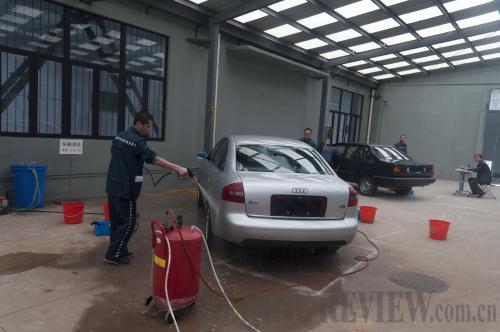|
 |
|
LEARNING SKILLS: A prisoner in Wujiaochang Prison in Shanghai learns to polish cars on April 2 (COURTESY OF WUJIAOCHANG PRISON) |
Zhao agreed to meet with Wang, though he remained skeptical. Wang is a private entrepreneur. Since 1985, he has worked to help ex-convicts.
"Although they committed crimes, they already paid the price by staying in prison," Wang said, talking about the purpose of his efforts. "As they are released, they need a new start and to get involved in society. All they need is another chance."
First, Wang employed ex-convicts in his own company. Then several other private companies joined, and in 2007, with the support of the government of Jing'an District of Shanghai, Wang set up the Hongzhi Center, a non-profit organization helping recently released prisoners find accommodation, employment and training opportunities.
Wang and the Hongzhi Center, which is located in the center of downtown Shanghai, have helped around 200 ex-convicts.
Wang's efforts have been followed by other civic organizations and received government approval. Since 2007, Shanghai has established halfway houses and transition stations in all its districts to help particularly troubled ex-convicts settle back into society.
Unlike halfway houses, transition stations provide information about employment, training and other available opportunities rather than accommodation.
As of June, Shanghai had set up 21 halfway houses and 297 transition stations, receiving more than 4,000 released prisoners.
Zhao's new job is to help police maintain traffic order. "When I first wore the uniform, I couldn't believe it was true," Zhao said. "As a person in prison for a long time under the control of police, I never imagined that one day I could help them."
Zhao works very hard and tries his best to help people in need on the road. He once helped a couple to find their lost child. "When they expressed their gratitude and I saw their smiles, I felt so warm and happy," Zhao said. "I was 26 years old when I was imprisoned for the first time and my sentence was 14 years. I thought my life had already been irreversibly ruined. I never believed I could be of any value to society."
More surprises came along. In 2011, with the help of local government, Zhao finally had his own apartment in a downtown community in Shanghai's Hongqiao District. In the same year, he got married, and in January, his daughter was born. His salary also rose from just over 1,000 yuan ($163) a month to 4,000 yuan ($652).
"It is like a dream come true," Zhao said. "It is a scenario that I never dared to imagine in prison. Now I have a family, a child and a job. It is too good to be true."
Zhao now frequently goes back to the prison and shares his own experiences to encourage others not to lose hope. "Some of them don't believe what I tell them," Zhao said. "I gave them all my phone number and asked them to call me if they need help after their release. Nobody can give up on you unless you give up on yourself."
Xu Tao (pseudonym), another ex-convict, also attributes his re-integration to society to the help of the Hongzhi Center.
Xu wanted to be a driver but had no driving license and no money to pay for the training. Wang paid for the training and after Xu got the license, Wang helped him to find a job.
"Many people make assumptions about those of us who've been in jail," Xu said. "We had no friends and even our family wouldn't accept us. It is in here that I get care and support, which gives me strength and confidence."
"Everybody makes mistakes," Wang said. "It is unfair to hold a person to his mistake for the rest of their life. These ex-convicts need more understanding and caring."
Email us at: yuanyuan@bjreview.com | 